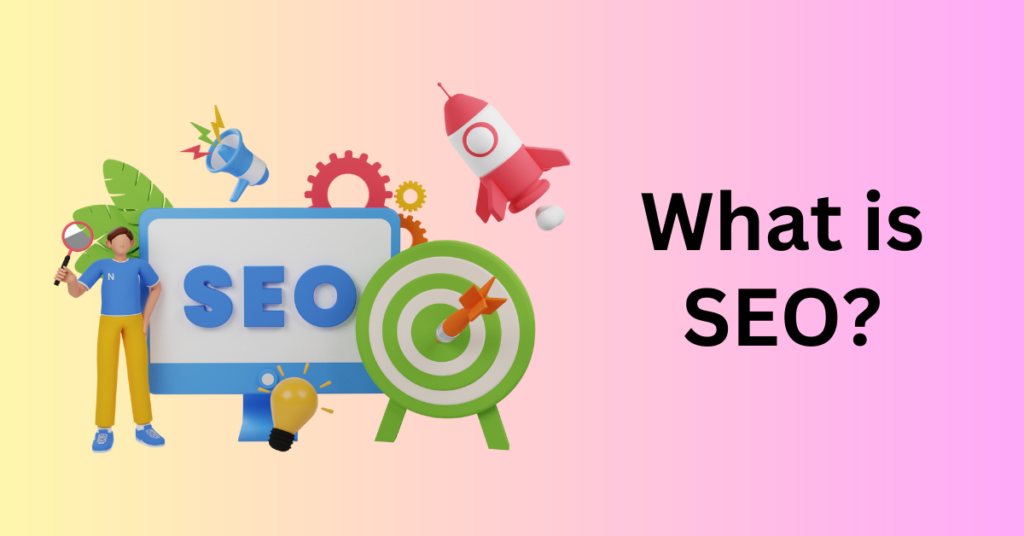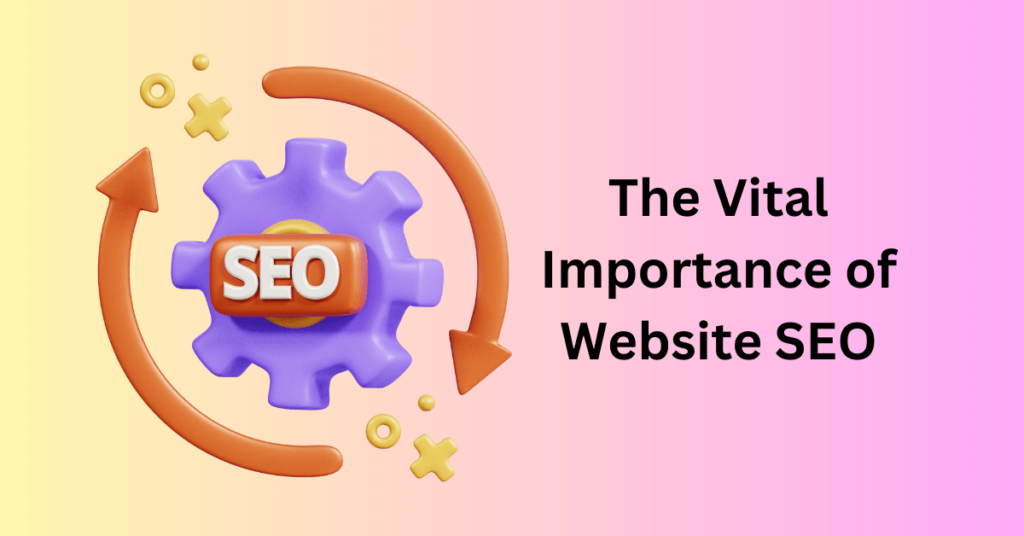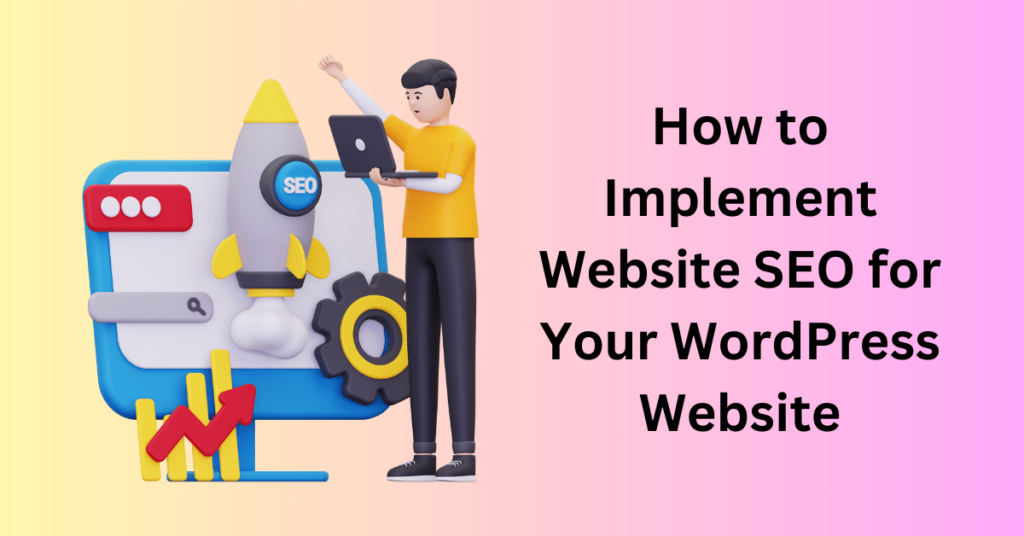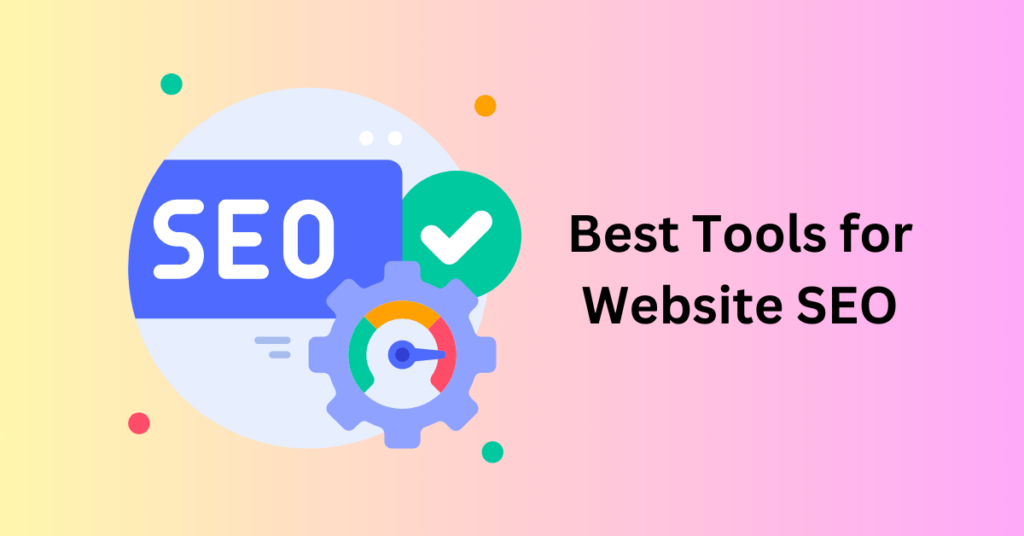Whether you’re a passionate blogger, a small business owner, or an aspiring e-commerce entrepreneur, your online presence can be a game-changer. In the world of websites, website SEO is your compass, guiding you through the ever-evolving landscape of search engine rankings. With the right strategies, you can reach the top of search results, attracting a flood of organic traffic and potential customers.
In this guide, we’ll delve into the core concepts of SEO, break down the essential techniques, and provide practical tips to elevate your website’s visibility and impact. By the end of your journey with us, you’ll be armed with the knowledge and tools you need to make your website not just visible but thriving in the digital universe.
Start Your WordPress Website with Bluehost Web Hosting
What is Website SEO?

Search Engine Optimization, or SEO, is the practice of optimizing your website and online content to improve its visibility and ranking in search engine results pages (SERPs). In essence, it’s the process of enhancing your digital presence to ensure that when people search for relevant keywords or phrases, your website appears prominently among the results.
SEO serves as the bridge connecting your content with your target audience, making it a vital component of online success.
The Significance of Website SEO
The importance of SEO cannot be overstated in our digital age. The vast majority of online experiences begin with a search engine query. SEO also ensures that your website is well-positioned to capture the attention of these users.
When your website ranks higher in search results, you benefit from increased visibility, targeted traffic, enhanced credibility, and trust. By optimizing your content and website for specific keywords, you attract users who are genuinely interested in what you have to offer, improving the likelihood of conversions.
How Website SEO Works
SEO involves a range of strategies and techniques, including keyword research, on-page optimization, off-page optimization, technical SEO, content creation, and user experience enhancements. Keyword research is fundamental. However, it also involves identifying the words and phrases that your target audience uses when searching for content or products related to your industry.
On-page optimization ensures that your content is structured and labelled in a way understandable to both users and search engines. Off-page optimization focuses on building high-quality backlinks to your site, signalling its authority and value.
Technical SEO addresses the technical aspects of your website, such as speed, mobile-friendliness, and schema markup, which facilitate effective crawling and indexing.
Content creation involves producing high-quality, informative, and engaging content tailored to your audience. Lastly, user experience improvements, such as site speed, responsive design, and easy navigation, contribute to the overall SEO success.
Start Your WordPress Website with Bluehost Web Hosting
Continuous Evolution and Adaptation
SEO is not a one-time effort but a continuous and dynamic process. Search engines regularly update their algorithms, and user behaviour shifts over time. As a result, staying competitive in the digital landscape requires ongoing attention to SEO.
Mastering SEO can help you cut through the digital noise, reach your intended audience, and achieve your online objectives. It’s a multifaceted discipline that combines technical and creative elements to enhance your online presence and connect with your audience effectively.
Start Your WordPress Website with Bluehost Web Hosting
The Vital Importance of Website SEO

In the modern digital landscape, the importance of Search Engine Optimization (SEO) cannot be overstated. It serves as the linchpin that connects businesses, content creators, and individuals with their intended audience. Here’s a detailed exploration of the critical significance of SEO:
1. Increased Visibility and Web Traffic
At its core, SEO is about boosting the visibility of your website on search engine results pages (SERPs). When your website ranks higher in search results, it is more likely to be noticed by users.
Research shows that the majority of users tend to click on one of the top results. This means that by securing a prime position on SERPs, you can significantly increase the traffic to your website.
In essence, SEO is the vehicle that drives organic traffic to your online doorstep.
2. Targeted and Quality Traffic
One of the standout features of SEO is its ability to attract targeted and high-quality traffic. By optimizing your content for specific keywords and phrases, you can then ensure that the people visiting your website are genuinely interested in the information, products, or services you provide.
This not only increases your chances of conversion but also helps in building a loyal audience.
3. Credibility and Trustworthiness
Websites that consistently appear at the top of search results are often perceived as more credible and trustworthy by users. When your website ranks well, it conveys a sense of authority in your field.
This trust factor can be a significant boon, particularly for businesses and brands, as it instills confidence in potential customers and visitors.
4. Enhanced User Experience
SEO isn’t solely about keywords; it also encompasses improving the overall user experience. Search engines take user experience into account when determining rankings.
Therefore, by investing in aspects like faster page load times, mobile-friendliness, and user-friendly navigation, you can satisfy search engine requirements and create a more enjoyable experience for your website visitors.
5. Measurable Results and Data-Driven Insights
Unlike some marketing strategies, SEO provides measurable results. Through the use of various analytics tools, you can track the performance of your SEO efforts. This data can then offer invaluable insights into what works and what doesn’t.
In addition, it allows you to refine your strategies, target the right keywords, and adjust your approach for optimal results. This data-driven approach is a significant advantage in the ever-changing online landscape.
In summary, SEO is not just an option but a necessity for anyone seeking a meaningful online presence. It’s a multifaceted discipline that goes beyond mere technicalities and keywords; it’s about connecting with your audience and establishing your brand as a trusted source of information or products.
By mastering SEO, you can rise above the digital noise, reach your intended audience, and achieve your online objectives.
Start Your WordPress Website with Bluehost Web Hosting
The Mechanics of Website SEO: A Comprehensive Overview

Search Engine Optimization (SEO) is a multifaceted process that involves a combination of strategies and techniques designed to improve a website’s visibility and ranking on search engine results pages (SERPs). Here, we delve into the mechanics of SEO to provide a detailed understanding of how this complex but vital discipline works.
1. Keyword Research
The foundation of SEO is keyword research. This process involves identifying the specific words and phrases that your target audience uses when searching for content or products related to your industry.
It’s about understanding the language your potential visitors speak and crafting your content to align with their queries. Keyword research tools and data analytics help SEO professionals and website owners pinpoint high-impact keywords to target.
2. On-Page Optimization
On-page optimization is the practice of fine-tuning individual web pages to be more search engine-friendly. This includes optimizing meta tags, headers, and URLs to incorporate chosen keywords naturally.
Additionally, it involves structuring content for readability, ensuring proper keyword density, and using relevant multimedia elements like images and videos.
3. Off-Page Optimization
Off-page optimization primarily revolves around building high-quality backlinks to your website from other authoritative and reputable websites. These backlinks also serve as a vote of confidence in your content and website, signalling to search engines that your content is valuable and worth showing to users.
Building these backlinks through techniques like content marketing, guest posting, and influencer outreach is a crucial component of SEO.
4. Technical SEO
Technical SEO addresses the technical aspects of your website that impact its search engine performance. This includes ensuring that your website is optimized for mobile devices, has fast load times, and features clean and accessible HTML and CSS coding.
Technical SEO also involves configuring your website to enable easy crawling and indexing by search engine bots. Elements such as XML sitemaps, robots.txt files, and schema markup are all part of the technical SEO landscape.
5. Content Creation
High-quality content is the heart and soul of SEO. Search engines aim to deliver valuable and relevant content to users, and content creation is how website owners fulfil this requirement.
Crafting informative, engaging, and well-researched content not only attracts users but also showcases your expertise in your field. Content can take various forms, including blog posts, articles, videos, infographics, and more.
6. User Experience (UX) Enhancements
A seamless and user-friendly experience is an integral part of SEO. Search engines value websites that offer a good user experience. Factors such as fast page load times, mobile responsiveness, clear navigation, and user-friendly design all contribute to an improved UX.
These elements also help retain visitors and reduce bounce rates, further enhancing your SEO performance.
In conclusion, SEO is a dynamic and evolving discipline that combines the technical aspects of website optimization with creative content creation and marketing. It’s not a one-time effort but an ongoing process that adapts to changes in search engine algorithms and user behaviour.
By mastering the mechanics of SEO, website owners can improve their online presence, connect with their target audience, and ultimately achieve their digital marketing goals.
Start Your WordPress Website with Bluehost Web Hosting
Internal and External Links in Website SEO

Internal and external links are crucial components of SEO. They play a significant role in how search engines assess and rank your website.
Internal Links:
Internal links are an integral component of a well-structured website, serving various purposes in the realm of Search Engine Optimization (SEO). These links connect different pages within the same website, creating a web of interconnected content.
Here’s an in-depth look at the importance of internal links in SEO:
Navigation and User Experience: Internal links are crucial for facilitating navigation and enhancing the user experience. They help users find related or relevant content on your website, encouraging them to explore further. This, in turn, reduces bounce rates and increases the time users spend on your site, which are positive signals for search engines.
Distributing Page Authority: Internal links distribute what’s known as “page authority” or “link equity” throughout your site. When you link from a high-authority page to another page, you’re passing some of that authority to the linked page, potentially boosting its ranking potential. This is particularly useful for ensuring that important pages on your site receive the attention they deserve.
Keyword Relevance: When you use anchor text (the text that’s clickable in a hyperlink) strategically in internal links, you can signal to search engines the keywords that are relevant to the linked page. This can help search engines understand your content better and improve its ranking for those keywords.
Content Hierarchy: Internal links help establish a clear content hierarchy on your website. By linking from category or pillar pages to more specific, in-depth articles, you’re guiding both users and search engines through the structure of your content.
External Links:
External links, also known as outbound links, point from your website to other websites on the internet. They have a different role in SEO and can significantly impact your website’s performance.
Here’s a detailed look at external links in the context of SEO:
Credibility and Trust: When you link to authoritative and reputable external websites, it can enhance your own website’s credibility and trustworthiness in the eyes of both users and search engines. By providing outbound links to valuable sources, you demonstrate that you’re committed to delivering accurate and well-researched information.
Relevance and Context: External links can provide context and relevance to your content. They can support your claims, offer additional information, and enrich the user’s experience. This can lead to longer time spent on your site and lower bounce rates, both of which are positive signals for SEO.
Link Building: External links also play a crucial role in your website’s link profile. Search engines consider the quality and relevance of the sites you link to when assessing your website’s authority and trustworthiness. Linking to high-quality, relevant websites can positively influence your site’s SEO performance.
Collaboration and Networking: In some cases, external links can foster collaboration and networking with other websites. For instance, when you reference or cite another website’s content, it can lead to them noticing your website, possibly resulting in future collaboration opportunities or backlinks to your site.
In short, both internal and external links play significant roles in SEO. Internal links are primarily about enhancing user experience, distributing authority, and establishing content hierarchy within your website. External links, on the other hand, help improve credibility, relevance, and link-building opportunities. A well-balanced approach to internal and external linking can contribute to a more robust SEO strategy and a more authoritative and user-friendly website.
Start Your WordPress Website with Bluehost Web Hosting
How to Implement Website SEO for Your WordPress Website

Implementing SEO for your WordPress website is essential to improve its visibility on search engines and drive organic traffic. Here are 7 steps to help you optimize your site for search engines:
Step 1. Keyword Research
Keyword research is the foundation of SEO. Identify relevant keywords and phrases that your target audience might use to find your content. Use tools like Google Keyword Planner, SEMrush, or Ahrefs to discover high-volume, low-competition keywords. Once you’ve compiled a list of keywords, use them strategically in your content, titles, and meta descriptions.
Step 2. Quality Content Creation
Create high-quality, informative, and engaging content that aligns with your chosen keywords. Focus on providing value to your audience. Write in-depth articles, blog posts, or product descriptions that address the needs and questions of your target audience. Use headings, bullet points, and internal linking to make your content more accessible and reader-friendly.
Step 3. On-Page Optimization
Optimize your individual web pages for search engines. This includes using your target keywords in the title tags, meta descriptions, and content. Ensure that your URLs are clean and descriptive, and use header tags (H1, H2, H3, etc.) to structure your content. Optimize images by adding alt tags and compressing them for faster loading times.
Step 4. Mobile Optimization
With a significant portion of web traffic coming from mobile devices, it’s crucial to have a responsive design. Ensure that your WordPress theme is mobile-friendly and that your website loads quickly on smartphones and tablets. Google considers mobile-friendliness when ranking websites.
Step 5. Site Speed and Performance
A fast-loading website is critical for SEO. Slow-loading pages can result in higher bounce rates and lower search engine rankings. Use caching plugins, optimize images, and choose a reliable web hosting provider to improve your site’s performance. Regularly monitor your website’s speed and fix any issues that may arise.
Step 6. Technical SEO
Addresses technical aspects like sitemaps, robots.txt files, and URL structure. Install an SEO plugin like Yoast or All in One SEO Pack to simplify the technical optimization process. Configure these plugins to generate XML sitemaps, control indexing, and manage other critical SEO settings.
Step 7. Backlink Building and Off-Page SEO
Acquiring high-quality backlinks from reputable websites can significantly boost your SEO efforts. Develop a backlink-building strategy by guest posting on relevant blogs, reaching out to influencers, and promoting your content on social media. Focus on creating shareable, valuable content that naturally attracts backlinks.
Incorporating these steps into your WordPress SEO strategy will help your website rank higher in search engine results, driving more organic traffic and increasing your online visibility. SEO is an ongoing process, so regularly monitor your site’s performance, track changes in search engine algorithms, and adapt your strategy accordingly to maintain and improve your rankings.
Start Your WordPress Website with Bluehost Web Hosting
Best Tools for Website SEO

Search Engine Optimization (SEO) is a vital component of any successful online marketing strategy, and it relies heavily on a diverse set of tools and techniques to enhance a website’s visibility in search engine results. These tools encompass a wide range of functionalities and purposes.
Keyword research tools are fundamental in identifying the most relevant keywords and phrases for a website, helping businesses understand what their target audience is searching for. Google’s Keyword Planner and tools like SEMrush and Ahrefs are commonly used for this purpose.
On-page SEO tools, such as Yoast SEO and Moz, enable website owners to optimize their content, meta tags, and overall structure, ensuring that their web pages are well-optimized for search engines. Off-page SEO tools, including backlink analysis tools like Majestic and LinkResearchTools, are essential for assessing a website’s backlink profile and monitoring the quality and quantity of inbound links.
Technical SEO tools like Screaming Frog and Google Search Console help identify and address issues related to website performance, crawlability, and indexing. Additionally, content management systems like WordPress often have SEO plugins that simplify on-page optimization.
Furthermore, analytics tools like Google Analytics and Google Search Console provide invaluable insights into a website’s traffic, user behaviour, and performance in search results, helping businesses refine their SEO strategies.
Social media monitoring tools like Hootsuite and Buffer can also complement SEO efforts, as social signals are becoming increasingly important for search engine rankings.
In summary, the tools for SEO are diverse and essential for any digital marketing strategy. They help businesses uncover valuable insights, optimize their websites for search engines, and monitor their progress, ultimately contributing to improved visibility and better online performance.
Start Your WordPress Website with Bluehost Web Hosting
Conclusion – Ultimate Website SEO Guide for New Website Owners
Congratulations! You’ve made it to the end of “The New Website Owner’s Guide to SEO,” and we hope your journey through the world of search engine optimization has been both enlightening and empowering. While we’ve covered a lot in this guide, remember that SEO is an ever-evolving field, and your website’s success will depend on your ability to adapt and grow alongside it.
As a new website owner, you’ve gained invaluable insights into the essential practices, techniques, and strategies that can elevate your website’s visibility and reach. Also, you now understand the significance of keyword research, the importance of high-quality content, the role of internal and external links, and the impact of mobile optimization and site speed.
But don’t stop here. In fact, your SEO journey has just begun. It’s a path of continuous learning, experimentation, and refinement. Stay updated with the latest trends and algorithm changes in the SEO world. Test different strategies and tools to see what works best for your website.





